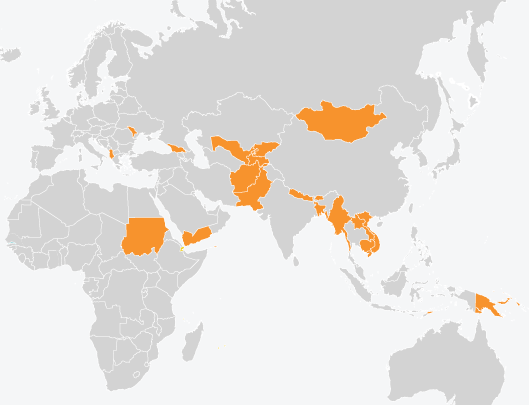
The Regional Hubs are a key knowledge exchange and knowledge brokering mechanism for KIX. Since March 2020, the hubs have been steadily setting up their operations and their regional agenda, contributing to the development of KIX’ latest funding opportunity and adapting their work to accommodate the current COVID-19 pandemic. In this news item, we provide an update on the progress and priorities of the KIX Europe, Asia and Pacific hub.
Latest activities
Following the online launch of the KIX EAP hub on May 27, 2020, they led a consultation to identify priorities and challenges in the 21 GPE partner countries that the hub oversees in the region. Findings of that exercise were published in a report that will help to define the hubs priorities and activities. The Hub also released its first newsletter in July 2020.
Regarding operations at country-level, the hub started, in collaboration with countries, the organization of national KIX Steering Committees and the selection of National KIX Coordinators, which act as in-country liaisons, coordinating and facilitating KIX activities on the ground.
The hub continues to host online meetings, including the most recent webinar that took place July 22, 2020 on “Implementing Monitoring, Evaluation & Learning (MEL) during COVID-19: Thoughts, Ideas & Reflections”.
Summary of key regional priorities
To identify the priorities of the GPE-member countries that the hub oversees, KIX EAP led a process from March to July 2020 to identify shared policy challenges for public education systems. The process involved consultations with government and non-governmental education stakeholders from the countries, regional experts, and a review of education sector plans and regional education analyses. The report on the results of this process revealed the following priorities:
1. Realizing the potential of new curricula
To make teaching more effective and improve learning outcomes, countries of the EAP region need to find appropriate ways to better align the different components associated with the implementation of new curriculum.
2. Optimizing the use of Education Management Information Systems (EMIS)
A central need is to optimize EMIS by improving data usage. The challenge is to create innovative ways to build capacities in Ministries of Education and other offices in charge of education management to organize, interpret and integrate data in from school level to the central/federal level.
3. Ensuring inclusive access and stronger learning outcomes for girls and boys
It is necessary to identify, adapt, contextualize and scale effective, culturally responsive approaches to improve gender equality in education access, retention and learning outcomes.
4. Improving distance teaching and learning
Educational systems need to learn more about how to contextualize and integrate successful experiences of distance education, including information and communication (ICT) tools and others. To be effective, they must find ways to connect students and teachers, and to close the digital gap, paying particular attention to vulnerable groups.
The results of the priority identification process informed the recently launched KIX Call for Expressions of Interest for the Europe, Asia and Pacific Region which is open until September 2, 2020.
Adaptation to COVID-19
Although initial meetings were planned face-to-face, the KIX EAP Hub has organized successful virtual meetings that have made it possible to establish the first contacts with the member countries. The consultation process was also done using tools like online survey and virtual interviews.
